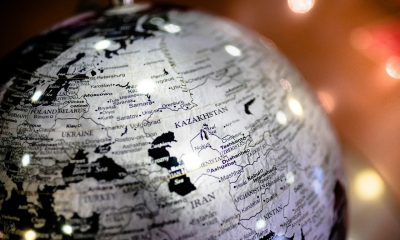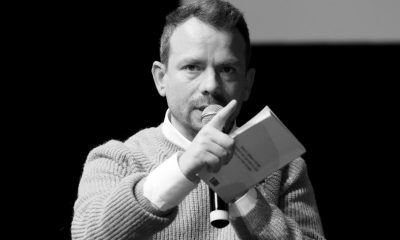Azerbaidžanas
Konferencijoje klausoma, kaip Vakarai ir Europa gali pasimokyti iš Azerbaidžano

A major conference heard how the West and Europe can learn from Azerbaijan in fostering religious tolerance and also in countering a disturbing rise in hate speech, rašo Martinas Bankai.
The event in Brussels today (5 December) was called “Promoting inter-religious and inter-cultural dialogue for a safer world” and gathered religious leaders, politicians and others in day long debate.
The conference was organised in cooperation with the Institute for Freedom of Faith and Security in Europe and the New Direction Foundation for European Reform, and the Embassy of Azerbaijan in Belgium.
A keynote speaker was former UK Conservative MEP Sajjid Karim, who is CEO of Haider Global BVBA, who told the audience he was “very concerned” by what he called “a rise in destructive forces at the national level.”
“We are seeing evidence of national leaders compromising on cohesion for political advantage,” he said.
The Briton, who, in 2004, was the first British Asian to be elected to the European Parliament, related an example of visiting a synagogue during a recent visit to Baku where,he said, he witnessed “little or no need” for protection.
He contrasted this with an experience in Liverpool and Manchester when he was an MEP when he visited synagogues there or events involving the Jewish community where he saw “layers” of protection.
He said the fact that there was no perceived need for this in Baku reflected well on how Azerbaijan had tackled the issue of multi culturalism.
“It speaks volumes for religious tolerance in Azerbaijan and what we can learn from that country.”
Another speaker in the opening session, on the “role of religion in today’s world” was Chief Rabbi Pinchas Goldschmidt, President of the Conference of European Rabbis, who told the participants that he believes Azerbaijan is a model for others to follow.
“Even in the most difficult period of the Soviet period, it was a centre of religious tolerance, especially towards the Jewish community.I am happy to say that, even in a secular world today, this continues,” he said.
“Europe and Europeans are increasingly becoming more and more secular but radical religion continues to define our society and we cannot ignore this. That is why it is so important to support moderate religion.”
Also speaking in the same session was Daniel Holtgen, special representative on anti-Semitic, anti-Muslim and other forms of religious intolerance and hate crimes at the Strasbourg-based Council of Europe, who said that latest data showed that some 25 per cent of people in Europe do not identify with any particular religion.
“At the same time hate crimes against religious minorities are on the rise,” he noted.
He said Jews make up just one pent of the UK population but account for 25 per cent of all hate crime. There were 2,000 reported attacks against Jews in the UK last year, he said.
Muslims account for nearly 50 percent of hate crime in the UK, with 3,500 such attacks in the past year, he said.
He said such attacks were also now happening “in countries where you do not expect it,” including Germany where, last year, there were 3,000 attacks against Jewish people and 1,000 against Muslim people.
“Yes, we live in a secular world but we are also seeing, at the same time, more and more such attacks against Muslims, Jews and others,” he said.
He added, “We need to tackle this problem including the internet which gives people a platform for such things.”
“We need to learn for each other including the Azerbaijan experience and tackle this at the local level, in towns and on our streets. Living with diversity is not just about tolerance but about respect.”
Ventzeslav Sabev, deputy general secretary of the Geneva Geostrategic Observatory, told the debate about a project involving young people who had produced the “youth charter” which details some of the challenges, including religious tolerance, facing society.
Another speaker, Aynur Bashirova, European and Asian Desk Coordinator at the Heartland Initiative and a member of the European Jewish Association, also spoke about anti-Semitism and “Muslim phobia”, saying there were “many factors” for these.
She said, “These include background and education but one factor that stands out is a lack of knowledge, that is, the absence of people-to-people contact and not knowing about other people and just accepting whatever stereotypes are thrown your way.”
Intolerance and intolerant people are found everywhere and Christians, she argued, are not immune to some criticism as well, adding “but failing to seek knowledge (about others) is a moral crime to yourself.”
Jeyhun Rustamov, a representative of the Caucasus Muslims’ Board, told the session that type of intolerance spoken about during the conference was a “disease” and highlighted the need for more dialogue.”
He added, “It is a disease created by mankind.”
The session was moderated by Robert Tyler, a senior policy advisor at New Direction, who told the audience that a recent survey showed that, in the UK, Christians now account for less than 50 percent of the population.
A rising number of people now follow no religion, according to the survey, and this was a trend being replicated in other parts of Europe, said Tyler.
The event was told that Azerbaijan has been a “staunch advocate” of multiculturalism and has invested “significant” efforts in promoting such values.
Multiculturalism, it was said, is a “way of life” in the country as well as an key component of state policy.
The importance of promote a culture of peace and non violence has been recognised in UN General Assembly resolutions, it was said.
The conference was organised in cooperation with the Institute for Freedom of Faith and Security in Europe and the New Direction Foundation for European Reform.
During the various debates, participants were also able to enjoy a photo exhibition showcasing different faiths and common values. It was organised by Gunel Yusifi of the State Committee on Religious Associations of Azerbaijan.
Pasidalinkite šiuo straipsniu:
-

 Bangladešasprieš 4 dienas
Bangladešasprieš 4 dienasBangladešo užsienio reikalų ministras kartu su Bangladešo piliečiais ir užsienio draugais vadovauja Nepriklausomybės ir Nacionalinės dienos šventei Briuselyje
-

 Konfliktaiprieš 2 dienas
Konfliktaiprieš 2 dienasKazachstanas žengia: Armėnijos ir Azerbaidžano takoskyros tiltas
-

 Rumunijaprieš 5 dienas
Rumunijaprieš 5 dienasNuo Ceausescu našlaičių namų iki valstybinių pareigų – buvęs našlaitis dabar siekia tapti Pietų Rumunijos komunos meru.
-

 Kazachstanasprieš 4 dienas
Kazachstanasprieš 4 dienasVykdydami aplinkosaugos kampaniją, savanoriai atranda bronzos amžiaus petroglifus Kazachstane























